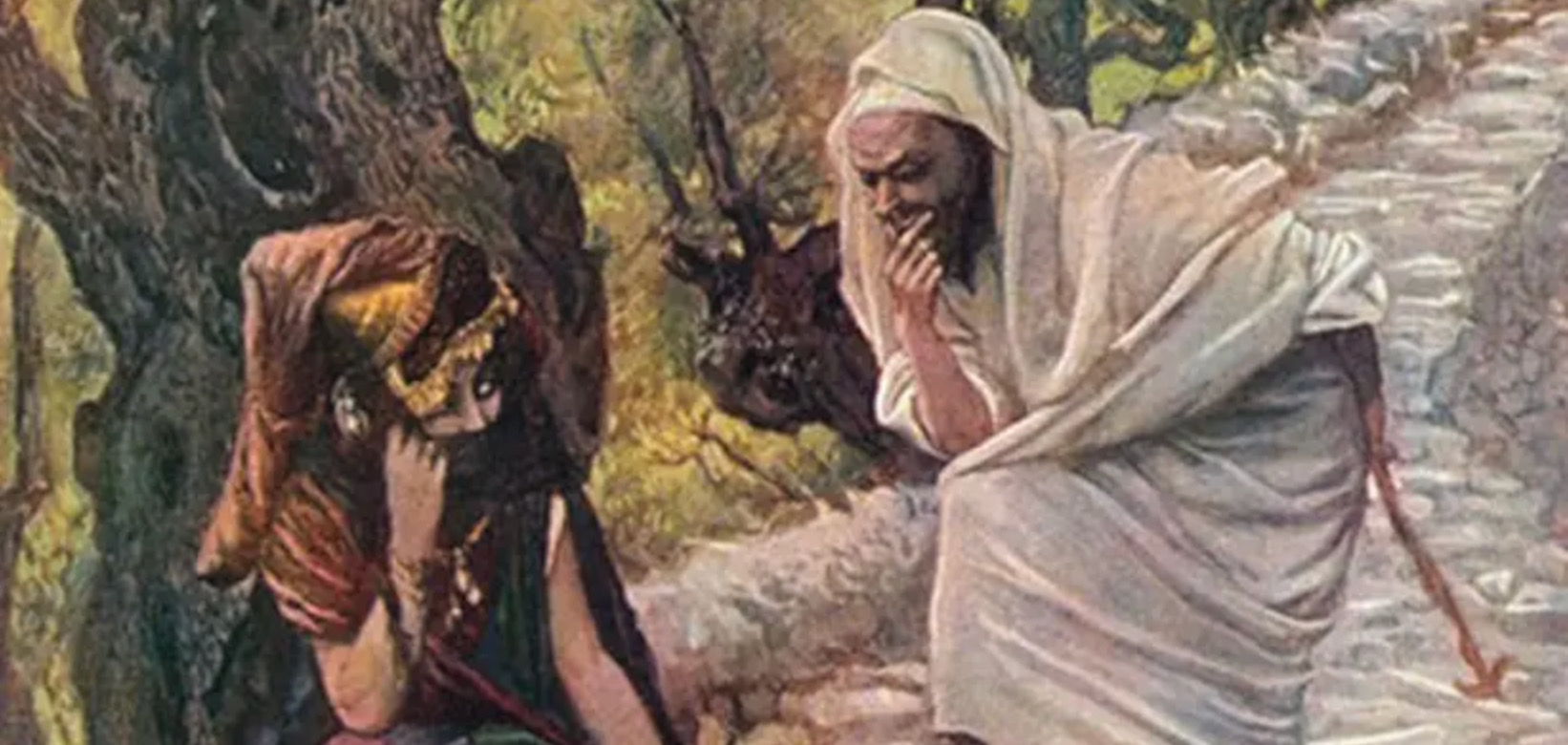
Luke 24:36-53 (Matins)
Hebrews 11:9-10, 17-23, 32-40
Matthew 1:1-25
Touchstone
And Jacob begot Joseph the husband of Mary, of whom was born Jesus who is called Christ.
(Mt 1:16)
In the Name of the Father and of the Son and of the Holy Ghost. Amen.
Which one is the real?
Who is the authentic ....
the good, the right?
You know, if you are a stranger in a strange land
(as our Epistle lesson made a few minutes ago),
these are important questions.
Look around you.
Who is the true,
and
who is false?
Is it the man who about to sell you land?
Is it the man who about to sell you home?
Is it the man who about to offer you a job on which your family's security will depend?
Who can be trusted?
Who has clean hands before God?
Can you see them?
In the Old West,
miners carried a piece
a fine-grained, dark schist
(interestingly, it is related to our word schism)
called a touchstone.
Miners would scrape ore upon it
to see
if it left the distinctive mark of gold.
What can we say about the ore of our souls?
Do we contain gold?
Who will be the touchstones who have the faculty to reveal this fact?
Do we detect gold,
or
have we permitted the world to dissipate our original alloy?
Are we radiant within, like the Sun?
Or have we become lifeless rock
like the dead stones spinning in a void all around us in the realm we call outer space.
The names Abraham or Jacob or Judah or David or Solomon are
glorious in the ears of men and women of the first-century
Levant.
They are announced over and again to effect an atmosphere of Patriarchal dignity.
We hear royal trumpets sounding at a distance.
But when we scrape beneath the surface, what do we find?
The Gospel of St. Matthew begins with a family tree
setting out unexpected touchstones
—
Hagar,
Zilpah,
Tamar,
Ruth.
Touch them,
and your goal might be revealed .... or not.
They tear upon the surface revealing truth.
When put to the test,
Abraham
attempts to pander off his wife to
Pharaoh
fearing his own skin (though there was no evidence of hazard or threat).
He simply imagines that this could happen.
Later,
he begat Isaac,
but not before He perverted God's commands
by resorting to Hagar, his wife's handmaid,
producing Ishmael, a name which means "child of shame."
The Ishmaelites turn out to be the wandering tribe to whom
Jacob's sons sold their own brother Joseph into slavery.
And the Ishmaelites would continue to be a stumbling block to Abraham's descendants,
accounted down to our own time to be a large segment of Islam.
Abraham begot Isaac.
And the blameless Isaac begot Jacob,
the son who set up an elaborate con game to steal
his father's blessing away from his brother, Esau.
Like his grandfather,
Jacob would also resort to his wife's handmaid, Zilpah, for illicit sex,
producing the Gadarenes,
the depraved tribe whom the Lord Jesus visits
in the eighth chapter of St. Matthew's Gospel.
Among Jacob's treacherous sons is Judah,
whose eldest son, Er, marries Tamar.
Sadly for Tamar,
|
Er, Judah's firstborn, was wicked in the sight of the Lord, and the Lord killed him.
(Gen 38:7)
|
As Tamar was yet to bear a child in Judah's line,
Judah directs his next eldest son,
Onan,
to marry her
(according to the dictates of Levirate marriage).
But Onan,
not wishing Tamar
to share in his inheritance from Judah,
practices the sin we now call Onanism
(coitus interruptus).
For this reason,
Onan too is erased from the family tree:
|
And the thing which he did displeased the Lord; therefore He killed him also.
(Gen 38:10)
|
Still being denied a child of Judah's line,
Judah promises
Tamar
the next eldest son,
Shelah,
but she must wait until he is grown to manhood.
Tamar realizes that Judah is playing for time,
so she take matters into her own hands.
She disguises herself as a prostitute and
waits for him to ride past on the road.
He does not have any means to pay for her services,
so he gives her his signet and staff
as a pledge for later payment.
But when Judah returns
to retrieve his signet and staff,
she has vanished.
Before long,
Tamar is presented to Judah for judgment,
for she is found to be with child,
and
Judah orders her burned to death.
She responds by publicly offering Judah his signet and staff
identifying the illicit child's father.
Judah is shamed,
and
he acknowledges
his treachery concerning Shelah
and
his gross sins
of adultery and incest.
The issue from this shameful union
are the twins Perez and Zerah.
Zerah's descendant
Achan
would be the cause of mass slaughter suffered by the Israelites
during the Siege of Jericho,
for which
he, his family, and his livestock were stoned to death.
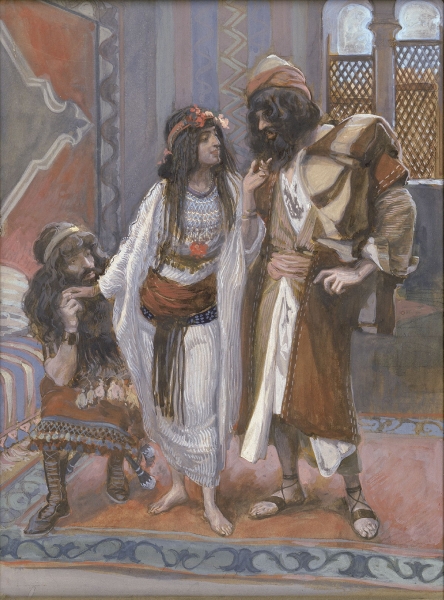
Having explored the first three generations,
we note a pattern in Matthew's narrative:
at key moments,
the Evangelist pauses in his series of "begats" from father to son,
to insert extra information
(e.g., the mention of Tamar).
In every case, he does this to reveal "the rest of story"
(as we would say).
For example,
"Salmon begot Boaz by Rahab."
It turns out that
Rahab is not an Israelite at all,
but a Canaanite,
whom the Book of Deuteronomy censures:
|
.... but you shall utterly destroy .... the Canaanite
|
And certainly you must not marry one!
The name Rahab means "prostitute."
Yet Rahab is accounted to be righteous in both Old and New Testaments
for overcoming Israel's enemies during the Siege of Jericho.
According to the Babylonian Talmud,
she converted to the religion of the Israelites at age 60 beginning with the contrite confession,
|
Master of the Universe! I have sinned with three things [with my eye, my thigh, and my stomach] ....
(Babylonian Talmud, Zavahim 116a-b)
|
That is,
like most of us,
she has permitted lust to dominate her visual imagination,
she has acted on those lusts,
and
she has lived the life of the belly
(as the ancient world would say),
ruled by her bodily desires.
From here we proceed to St. Matthew's next pause:
Ruth is also not an Israelite.
In a moving pledge made to Naomi, her mother-in-law,
Ruth said,
"Thy people shall be my people, and thy God my God."
Yet she is inevitably accounted by the Israelites to be an outsider,
by birth a Moabite and a widow, to boot.
Who are the Moabites?
They, like the hated Ammonites,
are
descendants of Moab and Ammon
born of the daughters of Lot,
who intoxicated their father
and
with whom each had intercourse.
This illicit child of Lot, then,
achieves marriage with Obed
by intoxicating him
and
by proffering, how shall I say this ....
a certain sexual favor that Israelite women would have condemned ....
a form of Onanism but in the extreme.
And it is proffered, of course, outside of marriage.
We proceed to Matthew's next pause:
|
David the king begot Solomon by her who had been the wife of Uriah.
|
Uriah's relationship to David is well known:
the loyal and valiant servant
whose wife the king would seize
and
whose blameless life the king would take.
The prophet Nathan presented the case to King David:
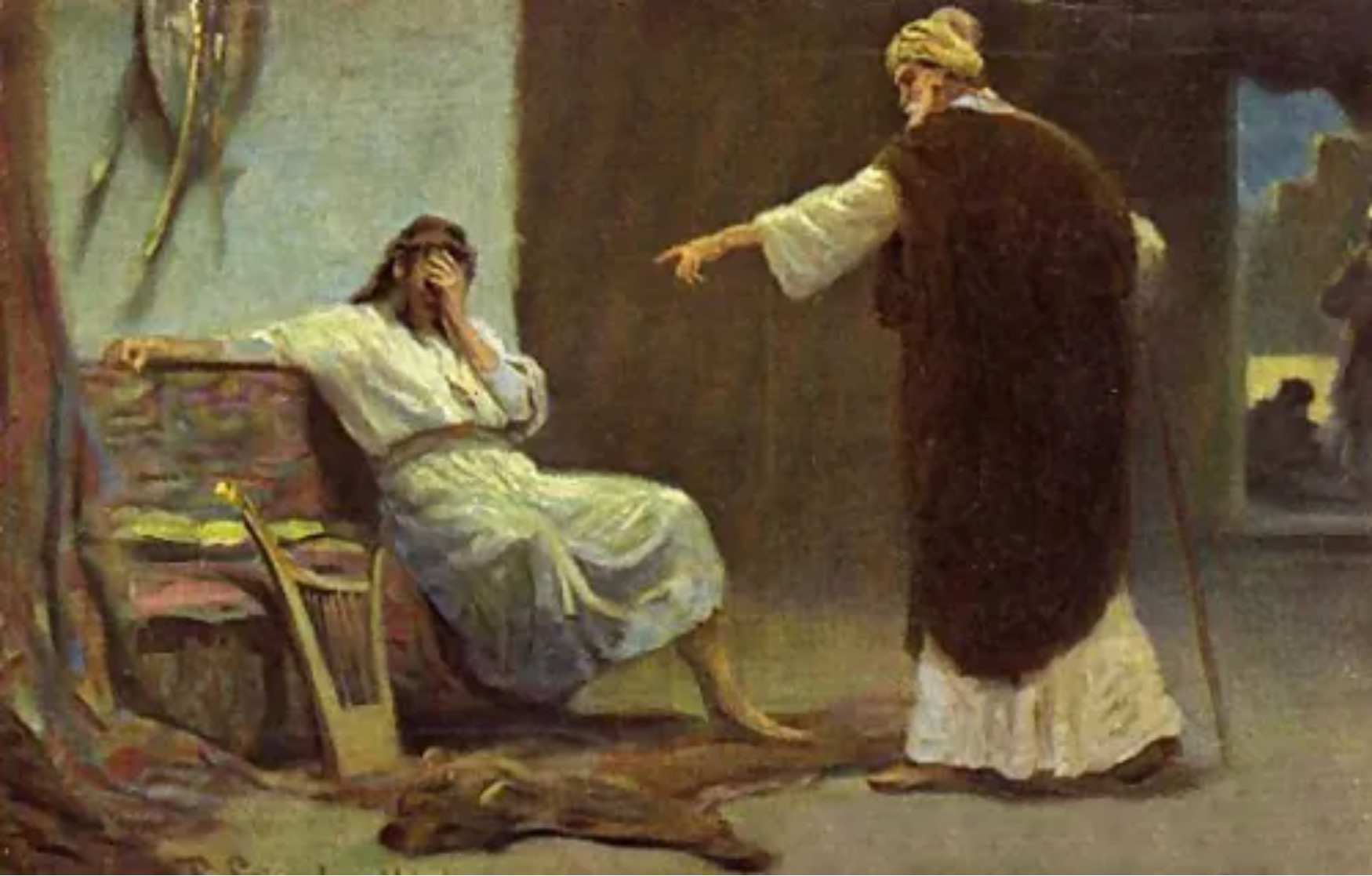
And the Lord sent Nathan unto David. And he came unto him, and said ....
There were two men in one city; the one rich, and the other poor.
The rich man had exceeding many flocks and herds: But the poor man had
nothing, save one little ewe lamb, which he had bought and nourished up:
and it grew up together with him, and with his children; it did eat of his
own meat, and drank of his own cup, and lay in his bosom, and was unto him
as a daughter.
And there came a traveler unto the rich man, and he spared to take of
his own flock .... but took the poor man's lamb, and slaughtered it for
the visitor that was come to him.
And David's anger was greatly kindled against the man; and he said to Nathan,
As the Lord liveth, the man that hath done this thing shall surely die ....
And Nathan said to David, Thou art the man!
(2 Sam 12:2-7)
|
The issue of this union is Solomon.
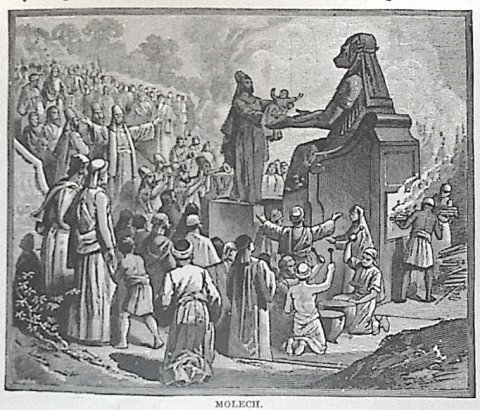
Solomon's lust knew no bounds, having
700 wives and 300 mistresses.
One of these wives,
Naamah, was an Ammonite,
again,
the illicit descendant of Lot's incestuous union.
Naamah would bear
the last king of the United Monarchy,
Rehoboam.
She is also a devotee of the idol Moloch,
for whom children were slaughtered in blood sacrifice.
On Naamah's account,
Solomon worshiped Moloch, too.
The message here,
at the very least,
is that the sheer number of children
produced by 1,000 royal consorts
leads one into a moral fog in which
children cease to be precious and singular.
Do you say this is hard for us to grasp today?
It shouldn't be for casual and indiscriminate sex
is all around us,
and its twin is indiscriminate and casual abortion.
This family album,
from Abraham to Rehoboam,
is one picture of scandal after another.
Story by story,
each one is cause for the deepest familial shame.
Yet one more detail,
still more damning,
has escaped us.
I say, "more damning" by the first-century Judean standard.
has escaped us.
St. Matthew's genealogy sets out the unmistakable proof that Jesus is not a Jew.
What?!
You call this man the Messiah?!
He is not even a Jew!
But rather He is an outsider:
a pariah.
As we would say in Brooklyn this afternoon: traif! ..... or,
to the most devout, shumtz.
For what makes you a Jew by the first-century standard is your mother's pedigree
(matrilineality).
You cannot be a Jew unless your mother is a Jew.
And converts to Judaism are impossible,
for this is more than a world religion;
it is a race.
Rahab, Ruth, Naamah do not meet this test.
These women are all "people of the land,"
to be despised .... even stoned to death.
Yes,
the title "Simon bar Jonah"
might confer a certain honor in one's village.
But only descent from your mother can make you a Jew.
We have confined our reflection to the period before the Exile.
We do not not have time for the rest,
which
depicts a different kind of treachery:
prefaced by the reforms of Josiah,
then elaborately expanded and refined in Babylon,
and
practiced in a reconstructed Temple.
But we
pondered all this together back in October.
For now,
let us say
that the first half of the genealogy involves sins of the loins
while the second half has to do with the sins of the heart, soul, and mind,
violating the Greatest Commandment.
Together,
these twenty-eight generations
of shame have produced Jesus of Nazareth,
Son of God,
our Lord and Savior.
And
this is the light,
according to its author's intention,
in which we are to read the Gospel According to St. Matthew.
☦
To set out a genealogy in the first century
is to announce one's bona fides,
to present one's credentials,
especially when a Messiah is expected
who must arise from the House of David.
So what do we make of an anti-genealogy
being the prologue to St. Matthew's Gospel?
Two details unlock our riddle.
First is the emphasis on Judah,
the founder of Judea.
And the second is the central position of the Exile:
fourteen generations before the Exile
and
fourteen generations after it.
As we have seen pondered at length during 2021,
the Exile is the burning point of life in Palestine.
A group of so-called elites have returned from hated Assyria
speaking not Hebrew, but Neo-Babylonian (i.e., Aramaic),
and
practicing not the Hebrew religion of the First Temple,
but a new religion:
Judah-ism (Judaism),
the religion of Judah.
St. Matthew's Hebrew name suggests that he is a Levite:
But the priests the Levites, the sons of Zadok, that kept the charge of my
sanctuary when the children of Israel went astray from me, they shall come
near to me to minister unto me, and they shall stand before me ....
(Ezek 44:15)
|
Do you see the suggestion here?
That certain Levites continued to be stewards of God's Holy Place
when the others went astray in Babylon?
These would not have been men who participated in the Exile.
Indeed, the Book of Ezekiel
(who is the grandson of Rahab)
is about the departure of YHWH from the Zion Temple on the occasion of
the Neo-Babylonian pollution.
Yet
by Levi-Matthew's lifetime,
the people God had set apart,
His chosen people,"
are locked in an acrimonious and interminable debate
over true religion
and
the true Temple
and
right doctrine.
They look around them,
and they cannot discern which is true and what is false.
Who will break this deadlock?
Whose authority is sufficient
to end this destructive contest?
We begin to understand why Jesus insists with such precision
on the nature of His
own bona fides
which
rise far above any and all tests of pedigree.
For He is not merely a son of God
as angels are (or as we might be).
He is the Only-begotten Son of God.
He is One with God.
He is God (Jn 1:1).
Finally, we unlock Matthew's genealogy:
Jesus the Christ is the ultimate Touchstone,
descended from touchstones,
who will reveal which is true gold and which belongs to the fool.
And He has come to redeem all.
Why was He sent?
To redeem the Lost Tribes of Israel.
both Hebrew and Jew,
Samaritan and Judean ..... but also
both Israelite and Gentile
according to the lights of his maternal ancestors.
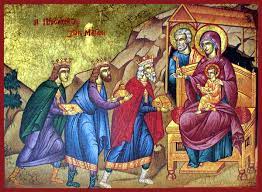
Here on the eve of His birth,
we are wont to call Him Savior.
And certainly He is,
yet much more.
For we do not merely celebrate a certain birth at a certain time which has saved us,
not merely an Incarnation at one point in history that has renovated our lifeworld,
not simply a gift of Eternal Life granted 2,000 years ago.
We celebrate
the One Who created all that there is "and without Him was not anything made that was made" (Jn 1:3).
We celebrate the Incarnate Word Who renewed His creation by touching the earth with His Divinity.
And
we celebrate the One Whose coming will bring all to End
as
He opens, for those Who love Him, Beginning ..... to Life which is the real and true.
By Matthew's time
the proverb
generositas virtus, non sanguis
("nobility arises from virtue, not bloodlines")
was well established
(Seneca, d. 64 A.D.;
Juvenal, b. 55 A.D.).
More than two hundred years earlier,
Patricians had lost their stranglehold on Roman governance
based on so-called noble birth.
With the birth of Jesus,
royal or priestly descent,
whether from Judah or David or Zadok,
is shown to be petty and vain.
What is the point ..... when you read the details?
Well might King Melchior, a gentile, lay gold beside the crib of this outcast.
For He alone is the true alloy
rendering all who incautiously draw near a pretense and an illusion.
To draw near to Him is no light thing.
It is never a light thing to draw near to the Real.
For His Word is
living and powerful, and sharper than any two-edged sword,
piercing even to the division of soul and spirit, and of
joints and marrow, and is a Discerner of the thoughts and
intents of the heart. And there is no creature hidden from
His sight, but all things are naked and open to the eyes of
Him to Whom we must give account.
(Heb 4:12-13)
|
For if you seek meaning, you must become meaning,
you must be filled with meaning.
If you wish for the lasting and the true, you must become true.
If you want the authentic, you must become authentic.
As we draw near to the birth
of the only True
and
the only Real,
prepare yourself.
And you do not seek the Face of God until you are ready to be Discerned
for what you are,
even pierced unto your heart and soul.
Bloodlines do not matter.
Descent does not matter.
Only the content of your
soul will matter now.
But do draw near.
Enter the Life He now opens to you,
for it alone is real and true and lasting.
Withal,
He is lowly and meek,
and
there is safety in putting upon yourselves His yoke.
In the Name of the Father and the Son and the Holy Spirit.
Amen.




